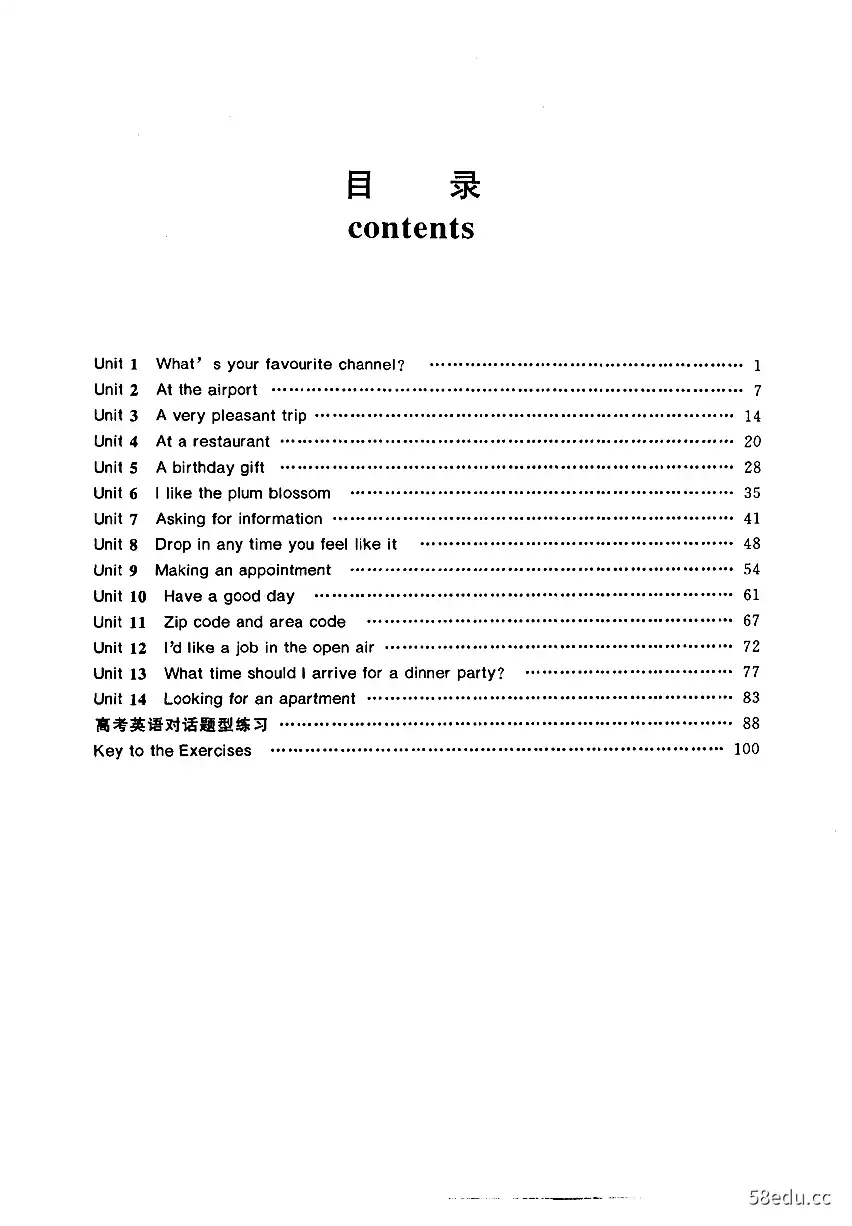《高中英语口语·高三》杜效明主编|(epub+azw3+mobi+pdf)电子书下载
图书名称:《高中英语口语·高三》
- 【作 者】杜效明主编
- 【页 数】 106
- 【出版社】 合肥:安徽科学技术出版社 , 2002.07
- 【ISBN号】7-5337-1931-X
- 【价 格】7.00
- 【分 类】英语课-口语-高中-教学参考资料
- 【参考文献】 杜效明主编. 高中英语口语·高三. 合肥:安徽科学技术出版社, 2002.07.
图书目录:

《高中英语口语·高三》内容提要:
《高中英语口语·高三》内容试读
Unit 1 What's your favourite channel?
I.Dialogues
Section 1
A:Mr.Wang,look at the big round iron tank over there.Is it a sea lab?
B:I think so.Scientists can stay in it for weeks and watch the sea creaturesat close quarters.
A:I would't like to work in a sea lab.It must be very dull
B:I don't quite agree with you,Mr.Brown.The deep sea must be wonderfulworld to explore.
A:Is that a new kind of diving device?
B:I think so.
A:Were all the exhibits here made in China?
B:Yes,every single one.
A:I must say your industry is developing rapidly.
B:I'm afraid we must be leaving now,Mr.Brown.The exhibition closes at
5.It is already five to.
Section 2
A:Which channel are you going to watch on Saturday evening?
B:Channel 5.There is an important match on.The future of our football
team depends on it.
A:I am tired of hearing about it.The cup is always difficult to win.
B:What's your favourite channel?
A:The Movie Channel.Do you like watching films?
B:I'm not sure if I do or not,but sometimes if a film is good,I enjoy seeing
it.
I.Vocabulary
1 iron'aian]n,铁
2tank[tek]n.(盛液体或气体的)大容器;坦克;罐,箱
1
3 creature[krit∫a]n.生物;动物4 at close quarters接近地,通近地5dull[dAl]a,沉闷的,单调的6 explore[iks'plb:]t.探索,勘探7 device[di'vais]n.仪表,装置,器件8 exhibit[ig'zibit]n.展览品vt.展出9 single['sigl]a.单一的,单个的l0 industry[indestri]n,工业l1 rapidly['repidli]ad.快,迅速l2 channel['tfaenl]n.频道13cup[kAp],奖杯,优胜杯l4 favourite['feivarit]a,最喜欢的
I.Notes to the Dialogues
1.Is it a sea lab?它是海下实验室吗?
lab是口语,它是laboratory的缩写形式。a sea lab=an undersea lab。
2.I think so.我想是的。
I think so是直接“赞同”(或同意),so是代词,代替上面所提到的内容。
3.Scientists can stay in it for weeks and watch the sea creatures at close quarters.学家们能在海下实验室呆几周,很近地视察海洋里的生物。
creature(=a living person or animal):生物(人或动物)。指人时常含有爱怜或轻蔑等感情色彩。如:
a lovely creature(=a beautiful woman):美女;a poor creature(=a contemptible person):可怜的人;a good creature(=a kind-hearted person):善良的人。
英语中还有animal和beast也是指“动物”,而animal(=any living thing that canfeel and move about)是动物的总称,包括人、兽、鸟、虫等,是区别于植物而言,但通常用于指人类以外的动物。在有些用法中,这个词不包括鸟类、鱼类、昆虫等生物。
例如:
Men,dogs,birds,flies,fish and snakes are all animals.人、拘、鸟、蝇、鱼和蛇都是动物。
The king often rode into the forest with some friends to shoot animals.国王常和
一些朋友一起骑马到森林打猎。beast(=four-footed animal):四足动物、野兽,它也可指性畜,如马、牛、狗等供骑乘或驱使的动物,也可指凶残的人或令人讨厌的人。
例如:
When they heard that an elephant was passing by,the six blind men asked thedriver to stop the beast so that they could have a“look”.当六个瞎子听说有一头象正在路过的时候,就请求赶象的人让这头巨兽停下来,以便他们能“看一看”。
They hate that beast of a foreman,他们恨那可恶的工头,animal是常用词,beastc2
常用于寓言中。
4.I wouldn't like to work in a sea lab.我不愿在海下实验室工作。
wouldn't表示委婉的否定。
5.It must be very dull.那一定非常枯燥。
must表示推测,具有较大的可能性。
6.I don't quite agree with you.我不完全同意你的意见。
agree可以与好几个介词连用,其意义要根据上下文来定。
①涉及讨论的题目,用agree about。例如:
They never agree about politics.关于政治问题,他们总是意见不一致。
②要确定一件事情,用agree on。例如:
The two sides have agreed on the date of negotiations.双方商定了谈判日期。
③涉及人、意见、想法、分析、解释等,用agree with。例如:I agree with her,我同意她的意见。
I quite agree with what you say,我很同意你所说的。
④涉及提议、建议,用agree to。例如:
He agreed to my proposal.他已同意我的提议。
Do you agree to this arrangement?你赞成这个安排吗?
7.I must say your industry is developing rapidly.我要说你们的工业发展迅速。
注意:must在这里并不是表示推测,而是“必须”的意思。
8.I'm afraid we must be leaving now.恐怕我们该离开这儿了。
afraid是形容词,后面可跟动词不定式,也可跟of+名词/动名词或从句,意义上大致相同。如:“她怕死”可以译成:
She is afraid to die.
She is afraid of death.
She is afraid of dying.
She is afraid that she will die.但在口语中,I am afraid的说法已与“怕”无关,而变成一种委蜿的言辞了。例如:
I'm afraid I can't help you.很遗憾,我不能帮助你。(蜿转地拒绝)
一Will you go with me?和我一起去好吗?
一I'm afraid I can't.我恐怕不能去呀。(避免决断的语气,事实上“不能去”)
9.It is already five to.已经是差五分五点了。
上一句说:The exhibition closes at5.所以这里的five to是five to five的省略形式。
l0.Channel5.第五频道。
中央电视台第五频道是体育节目频道。ll.I am tired of hearing about it..我讨厌听到足球。
tired在这里不是“累”的意思,而是“厌烦”、“讨厌”的意思。例如:be/get tired of sb,./sth.:对某人(或物)感到厌烦。be/get tired of doing sth.:做某事做厌了。I got tired of reading.我读书读厌了。
3
12.What's your favourite channel??你最喜欢哪个频道?
favourite在这里是形容词,意思是“特别喜爱的”。它也可以作名词用,意思是“特别喜爱的人或物”、“宠儿”、“心腹”。
13.I'm not sure if I do or not,but sometimes if a film is good,I enjoy seeing it.法确定是否喜欢,但有时如果电影很好,我还是喜欢看的。
I'm not sure.常用在较委婉的客套语中表示“不愿”、“不想”、“无法确定”等意思。
N.Additional Expressions
英语口语中,怎样回答对方的问话呢?一般可以分为确切的回答和不十分确切的回答。确切的回答就是绝不含糊地回答;而不十分确切的回答较委婉,有时是为了避免决断的语气,有时是想婉转地告诉人以不好的消息或拒绝的话语。
1.确切的回答
Oh,yes!啊,是的。
Of course.当然。
Exactly,正是,不错。
Surely.的确。
Quite so.正是。
Just so.正是。
Yes,certainly,是的,当然啦。
That's all right.那十分好。
That's splendid,那很好。
That's correct..正确。
You are quite right.你非常正确。I quite agree with you.我十分赞同你。I'm sure,我肯定,
That's true.那是对的。
That's right,那是对的。
Thatll do,行了。
That's just what I was thinking.,那正是我一直在考虑的事。
That's my opinion,too.那和我的意见一样。
There's no doubt about it,那是不容置疑的。
OK.好吧;行;对。
No.不,不行。
That's won't do.那不行。
No,that's wrong.不,错了。
No way!不可能!绝不可能!
That's impossible,那是不可能的。I can't agree.我不同意。
w
A.will you?
B.Can you see anything?
C.Certainly.
D.I'm sure there's no one at home.
E.shall we?
F.But that's impossible.
G.I see.
二、补全对话:下面是约翰(对话中简称J)与他的老板格林先生(对话中简称G)谈论
电视的对话,请根据上下文在每一空白处填上适当的句子或词语,使对话意思完整并正确。
J:I'm staying in tonight.1
G:Of course,you can.What's on?
J:2·3?
G:Yes,there is a guide in the newspaper.Here you are.Itll tell you tonight's pro-
grammes.
J:Thank you.4
G:Well,I always watch the News at Ten and then mostly sport.I never miss the foot-
ball match.
J:Perhaps there's not much sport on tonight.I'd like to watch the news.
G:That's OK by me,but why not 5 now?You can see what you like.
J:6·
三、编写对话:根据下面的提示,编写一段对话(字数100个左右)。
玛丽、安娜、凯特在询问彼此的兴趣和爱好。安娜喜欢看英语书,凯特喜欢看法语书。安娜喜欢跑步;玛丽喜欢爬山,说爬山有好处;凯特不太确信自己是否喜欢爬山,但她说她喜欢打篮球,因为打篮球有趣。玛丽同意凯特的观点,同时还说道:打排球也很有趣。安娜说她非常喜欢游泳。
6
···试读结束···
作者:俞珍妮
链接:https://www.58edu.cc/article/1663915312308834305.html
文章版权归作者所有,58edu信息发布平台,仅提供信息存储空间服务,接受投稿是出于传递更多信息、供广大网友交流学习之目的。如有侵权。联系站长删除。